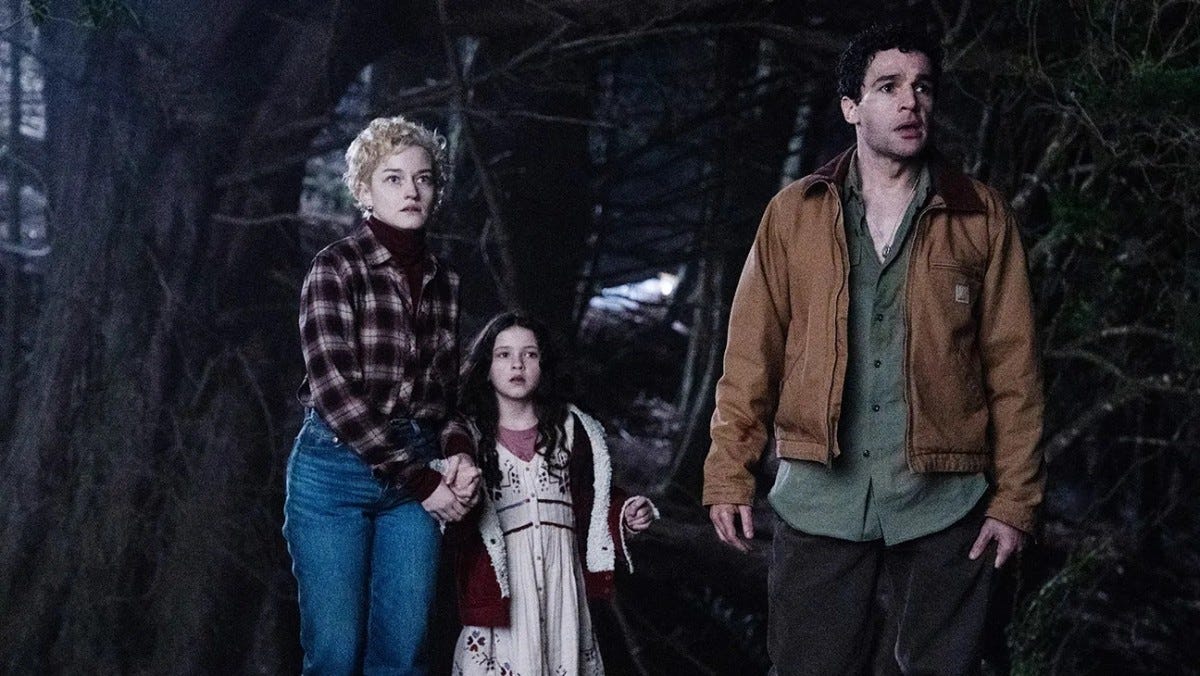Wolf Man (2025)
7/10
January is the ass end of the year, particularly when it comes to movies. This month is notorious for being Hollywood’s dumping ground, when studios release movies they have no faith in and expect to be commercially and critically unsuccessful. In that context, Wolf Man is a pleasant surprise. There’s nothing game-changing here, but it’s a tight revamp that strips away most werewolf lore we’ve come to expect (the full moon, wolfsbane, silver bullets, etc.) in favour of an emphasis on emotion, body horror, and family tragedy.
Director and co-writer Leigh Whannell, who previously helmed The Invisible Man, once again reinterprets a classic movie monster through the lens of toxic masculinity. The film opens in 1995 with young Blake Lovell (Zac Chandler) and his domineering, militaristic father Grady (Sam Jaeger) going hunting together. Grady justifies his rough treatment of Blake by concern for his son’s safety and wanting him to be able to protect himself.
Thirty years later, an adult Blake (Christopher Abbott) is a writer, currently “between jobs”; father of young Ginger (Matilda Firth), husband of journalist Charlotte (Julia Garner), and long estranged from his own father, who went missing many years ago. Receiving a letter that Grady has been declared legally dead, and needing to return to his father’s home in the Oregon wilderness to remove his belongings, Blake decides to take his family on vacation there to fix his relationship with Charlotte. En route they crash their truck after Blake sees a strange creature in the woods standing on two feet. As he and his family escape, it becomes evident the animal has bitten Blake. And the wound is starting to become infected…
Blake provides what might as well be the movie’s thesis statement when he tells Ginger, “Sometimes when you’re a daddy, you’re so scared of your kids getting scars that you become the thing that scars them.” Early on Blake briefly loses his temper at Ginger when she’s playing in the streets, but right away softens and apologizes. It’s clear he doesn’t want to repeat the same harsh upbringing he had with his own daughter. While this theme could have been better developed—there’s little evidence Blake has any serious anger problems or is aping his father’s disciplinary childrearing style—it’s enough to get the movie’s theme across.
Charlotte is less well-developed as a character, but comes into her own as the family begins to lose Blake and Charlotte must protect herself and Ginger from him. Wolf Man’s depiction of lycanthropy owes less to classic werewolf films and more to David Cronenberg’s The Fly, or for that matter Franz Kafka’s Metamorphosis: lamenting the transformation of a man into an animalistic creature, a descent marked by futile attempts to cling to his remaining humanity.
Whannell shows Blake increasingly unable to understand what his wife and daughter are saying to him, presenting his perspective as an increasingly surreal blacklight world. Meanwhile, they see him losing his power of speech, his hair and fingernails falling out, etc. Further working in the film’s favour, Wolf Man relies largely on makeup and practical effects rather than CGI. When done well, this approach give a greater realism even to movies with the most outlandish premises. Even if the effects are less effective when viewed in full daylight, noticeable during the climax of Wolf Man, CGI would be even less convincing.
Wolf Man’s effectiveness comes from its minimalist approach. Most of the film takes place in an isolated setting over a single night and revolves around three main characters: Blake, Charlotte, and Ginger. The word “werewolf “ is never mentioned, and the titular wolf man bears little resemblance to previous cinematic werewolves, e.g. being far less furry. But it works because it nails the essence of what werewolf stories are about, going back to the famous lines from 1941’s The Wolf Man: “Even a man who is pure in heart / And says his prayers by night / May become a wolf when the wolfbane blooms, / And the moon is full and bright.”
Even in the absence of wolfsbane and full moons, Blake is a man “pure in heart”, which is irrelevant when the effects of the werewolf’s bite take hold. Abbott’s performance and rapport with young Matilda Firth make up for deficiencies of the script. The two make the most of a recurring motif in which Blake puts Ginger’s hand on his forehead and asks, “What am I thinking about?” Ginger “reads” his mind to deduce that he’s thinking, “I love my little girl.” These scenes are affecting and do much of the heavy emotional lifting that help invest the viewer in Blake’s fate.
None of this reinvents the cinematic wheel, yet it all makes for an effective new take on the classic werewolf story with a solid emotional core. Call it grading on a curve, but for a January release this exceeded my expectations.





